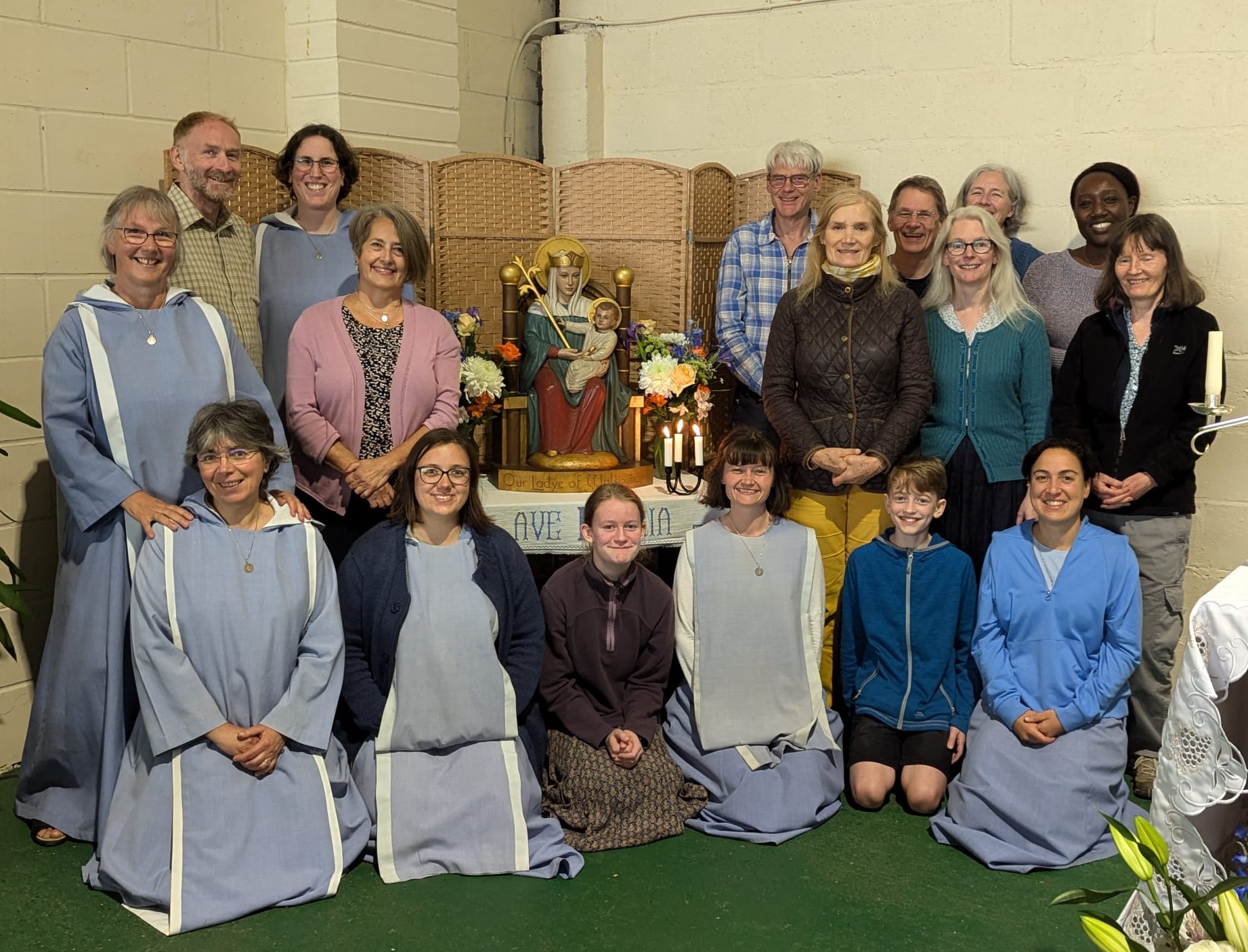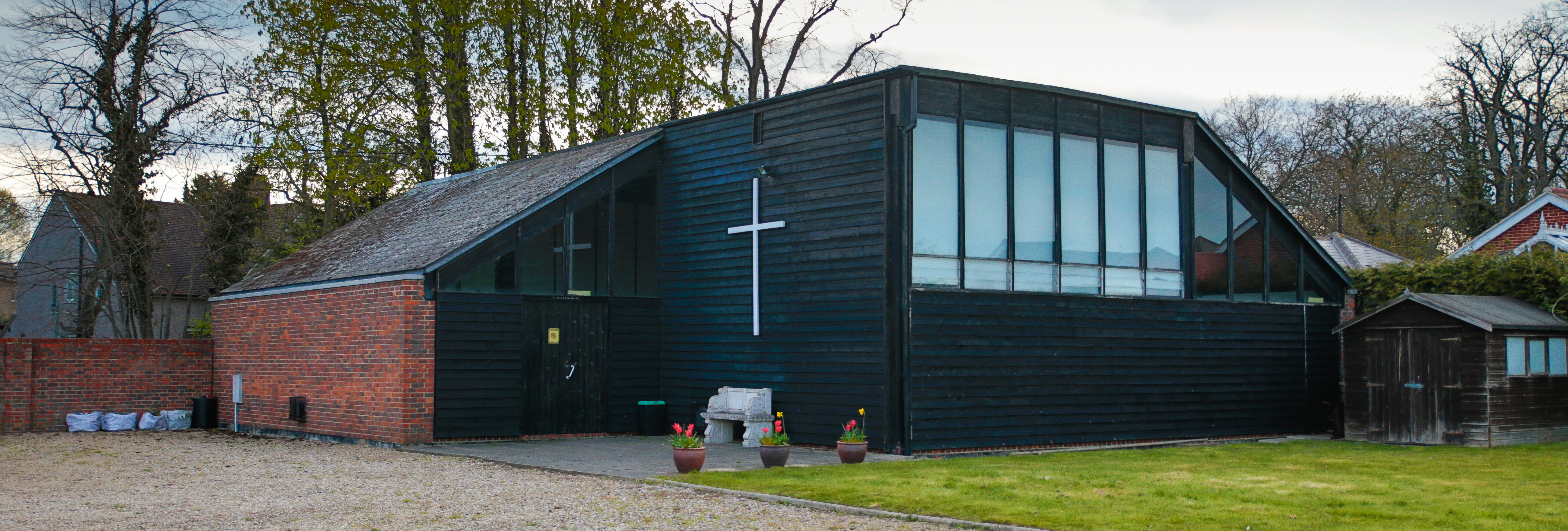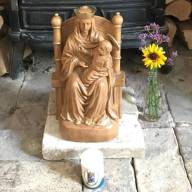
Casting light in our darkness
A recording of today's gospel and blog can be accessed here.
****
Today’s gospel (Matthew 11: 2-11) shows us two contrasting scenes, both of which cast a light on our faith in the coming of Christ, our Saviour. In the first scene, the disciples of John the Baptist approach Jesus and ask Him, apparently at John’s behest, whether He was the One who was to come. John did not send them for his own satisfaction; he knew full well who was to come, had been familiar with His coming since his earliest infancy, and likewise must have known the dignity of his aunt whose visits were always a blessing beyond all hope in the house of John’s parents Elizabeth and Zachariah. Rather, John sent his disciples to Jesus to learn what they needed to know in order, finally, to abandon the path of the Baptist, and follow Jesus instead. In the second scene, which immediately follows, Jesus asks the crowds, who had gone to see John previously, what it was that they saw in him – a reed shaken by the wind, or a man clothed in soft garments? The possibilities are ironic and deliberately provocative. Answering His own question, Jesus concludes by revealing John’s real identity as the prophet of the Messiah. Jesus affirms, again with an enigmatic paradox, that John was great but not as great as the least in the kingdom of heaven.
In this complex scene, what is it that the Lord seeks to teach us? We might say it is something about the complexity of vision and the need for faith before the approaching mysteries of His coming into the world. For in the first instance, John’s disciples are invited to look at the plain evidence: the blind receive their sight and the lame walk, leapers are cleansed and the deaf hear. There were an increasing number of recipients of such miracles in the days of Jesus: those who had been once afflicted and now walked free of their burdens. This was tangible evidence of who Jesus was, not least because it was a fulfilment of prophecy, for these were the very signs the prophesied Messiah was meant to produce. Jesus came to build a spiritual kingdom, a kingdom not of this world, but its fruits spilt over into the material world, and the healing from sin brought with it healing from the other disorders of this life. His invitation to John’s disciples, therefore, was for them to look and see; not to ignore the obvious; not to turn their eyes from the evidence on the basis that perhaps there was another explanation for what they saw. The challenge to them was to be simple, for it is perhaps one of the sins of the devout, as John’s disciples were, to be too complex, too involved in theological wrangling and minutiae. Their tendencies were those of the learned, and they needed this lesson of simple observation to set them free.
The lesson of the Lord to the crowds, however, is quite different. For the sin of the crowd, of the generally undevout, is not to be too complicated but to be too shallow; to be so immersed in this world that they cannot see beyond the surface level; to be so unreflective that they ricochet off the atmosphere of the mysteries before them. To the casual observer, driven on by no more than sensation-seeking curiosity, perhaps John appeared as a reed shaken by the wind, a wild and insubstantial thing; a creature of the desert, a holy mad man. John’s attraction for the shallow observer could have been the attraction that all curiosities hold for the vulgar crowd. So, Jesus shakes them with His question, and then He follows home with some of His often-searing irony:
What did you go out to see? A man dressed in soft garments? Behold those who wear soft garments are in kings’ houses.
But what is going on here if not that Jesus is now wrong-footing them, passing from one extreme to the other? Any half decent teacher should immediately spot the tactic: show the shallow ones some obviously wrong answers, and they have a chance of alighting on the right one. And then the right one comes as the fulfilment of the prophecy:
Behold I send my messenger before your face who will prepare your way before you.
In citing these words of Malachi, Jesus is saying that John is the prophet, and, if not yet that He Himself is the Christ, at least that the Christ is among them. The people would have to join up the dots for themselves, especially those who had heard Jesus’ reply to John’s disciples.
Today’s gospel then offers us these contrasting lessons. John’s disciples must approach the mystery of His coming through simplicity. They have vision but it needs to become focused. The crowd in contrast must approach this mystery through coming alive to faith. They have their reason and their wits, but they need to be enriched.
There are lessons for ourselves in both regards. Those who are devout rarely approach the mysteries with sufficient humility; perhaps they are mislead into the shallows by believing their learning will be enough, as if Divine Revelation were a communication package and not an invitation to a divine communion. Those who are not devout rarely approach the mysteries with sufficient faith; they barely approach the waters of the divine mysteries, believing that worldly insight will be enough, as if in this life God were another system to game, like all the others.
And, so why, in Jesus’ concluding remarks, was the least in the kingdom of heaven greater than John? Here, Jesus leaves the crowd, and John’s disciples if they were still in earshot, with a paradox that again is an invitation. There they were, awaiting the coming of the Prince of Peace who was expected to sweep away the enemies of Israel, and here was the Messiah, now revealing Himself in an unexpected mystery of divine humility. Jesus is the greatest in the kingdom of heaven simply because He makes Himself the least, the servant of all, emptying out His dignity to walk among us, to eat with us, and even to lie in the filthy surroundings of a tumbledown dwelling among animals, like the poorest of the poor. For this is how He intends to break through our complexity and our shallowness, our pride and our self-sufficiency, and to cast some light into our darkness to reveal to us the eternal depths of the love of the Father who sent Him to save us and bring us home.
The impossible dream
A recording of today's gospel and blog can be accessed here.
****
Today's gospel (Luke 1:26-38) recounts the mystery of the Annunciation which is, as it were, the mystery central to our charism in COLW. The Angel Gabriel came to Mary, greeting her with those words that are ever fresh: Hail Mary, full of grace, the Lord is with you. Mary is startled and troubled and inquires what this might mean. Gabriel explains to her that she will conceive a son and that He will be the saviour long-awaited by the people of Israel. Mary, hearing in these words the vocation God was calling her to from all eternity, offered her consent: let it be done to me according to your word.
In this gospel scene, Mary models for us three qualities that are intrinsic to our following of Christ. Perhaps surprisingly, the first of these is not a virtue but a state of mind: it is her objectivity. Our attachments are so deep, our wounds are so serious, that objectivity escapes us very often, but not so Mary. Mary, says St Luke, was greatly troubled and tried to discern what sort of greeting this might be. Her mind was not warped by gentle delusions about herself; her perceptions did not pass through a cloud of neediness. Her response, therefore, was not to say: well, where have you been, I’ve been waiting? Rather, it was to test the spirits, as St Paul says. Mary models for us the anti-enthusiast’s response to religious phenomena. It is not disbelief; rather, it is prudence. This response reflects equally her humility – for who would speak to a peasant girl in Nazareth in this way, she could fairly wonder – but we shall return to that further on.
Upon hearing Gabriel’s explanation, Mary models for us a second quality in this gospel scene with the following words: How will this be, since I am a virgin? What we hear in this response is no longer merely her objectivity but now her teachability. What she has heard is extraordinary. She, the lowliest of Nazareth’s denizens, is called to be involved in the realisation of the great hope of Israel. There is no doubt she understood both sides of this mystery: the fulfilment of the promise of God, and its startlingly humble and ordinary path. Teach me, Lord, is what her words mean here. Show me, Lord, your ways, for they are not ours. God’s plan for the saving of the human race would pass none of the stress tests the cynical human mind can put it under. But then, God could make the very stones sing if He so desires. He does not need high performance; just our consent. He does not need our achievements; He asks us only to return to our origins and become once more the clay in His hands. Here is Mary, then, mothering not only His Son to life, but in her example, showing His Son’s brothers and sisters how to follow Him. Be teachable. Ask God not why me? but how will this be?
And, finally, having heard how this will be, Mary promptly answers the call with humility. Gabriel’s final words – nothing will be impossible with God, spoken in reference to Elizabeth’s conceiving John the Baptist - are in fact the response to every query about the vocations we are all offered. Nothing is impossible with God. God, who makes manna in the desert and turns shepherds into kings, will now walk the earth to turn the stones of our hearts into the voices of his children. Let is be done to me according to your word, says Mary; fiat mihi secundum verbum tuum, in the Latin of St Jerome. Fiat mihi: be it done to me.
When we say yes to the Lord, we often seem to be saying yes to the Him only in the moment. But what we miss is that every moment on earth gathers around the eternal moment of God who wills us to join Him in due course in that eternal moment of His joy. To say yes then calls forth also our thank you, calls forth our joy; and joy itself, St Thomas Aquinas teaches us, is only one of the qualities of love, along with peace and mercy. At the same time, these human yeses that join His yes to us, echo also down the centuries, through all the hearts who ever, if only for a moment, turned to God, from the lowest sinner to the highest saint.
Mary’s yes began this chorus of restoration in objectivity, teachability, and in humility. We only need follow her example to see the impossible.
Vocation, not self-promotion
A recording of today's gospel and blog can be accessed via this link.
****
Today’s gospel (Matthew 13: 54-58) recounts an episode in which Jesus visits Nazareth and finds the population sceptical about His ministry. Where did this man get his wisdom and these mighty works? they wonder. Their questions come thick and fast, and before long the mood grows dark: They took offence at him. Jesus’ response to this precipitous judgement was philosophical but also practical. A prophet is not without honour except in his home town, He concluded, and He performed few miracles for them, the gospel says, because of their unbelief.
Sometimes, human beings are sunk simply by their own shortcomings. Here is Nazareth, the neediest of Israel’s villages, well known as a place of dishonour. And yet, instead of celebrating their local celebrity, the people were filled with scepticism at Jesus’ works. Was it not right to ask questions? Of course, it was. Was it not a normal requirement to discern well in such circumstances? Without a doubt. So, why did the Nazarenes go so wrong in the process?
The clue might be found in this gospel’s subtext, what lies beneath the surface. Where did this man get his wisdom? only appears to be a fair inquiry. Yet behind it is a kind of jealous attack. It is not Jesus’ wisdom that they were inquiring about. They were reacting instead to the very fact of it, like neighbours who react and say: have you seen what the Jones’s have done now? After that first question, therefore, every other inquiry was an attempt to demean the Messiah in their midst: Is not his mother called Mary? Are not his brothers James and Joseph and Simon and Judas? Yet again, we must read the subtext, the thing that lies beneath the surface: these questions were rhetorical, not genuinely interrogative. They were not about what they were about. They did not seek information. Rather, they sought to make the point that whatever Jesus had done, He was simply a local boy and didn’t deserve the acclaim. And there is the wayward human heart in a nutshell, souring like milk in the warm summer sun.
Jesus cannot heal us until we have fully recognised how broken we are, but we cannot fully recognise how broken we are when we are jealously comparing ourselves to others. The crowd’s questions almost amount to asking: why should we not be just as renowned as Jesus? Jealousy manifests itself in different ways; in the impious, it is simple, raw, and aggressive, as it is in this scene. In the pious, it might show itself through flattery or imitation or in an ill-disguised competitiveness for heavenly glory. But both categories of people are moved by the same force from within, the same instinct to want to show that they are as good as the one they are jealous of, or at least that those they are jealous of are no better than them. Perhaps it is because they do not know their own worth for only those who neglect their worth in God’s eyes look upon the qualities of others as a measure of their own failings.
But what is the measure of who we are, of what we are to become, and indeed of what we are worth? Are these things not determined by our vocation: our personal vocation, calling us to be our very own reflection of the goodness and beauty of our divine Creator, and our life’s vocation, calling us to some particular path of living? Instead of finding our guide in these two realities, we often allow who we are and what we are worth to be shaped by so many other forces in the human game of inauthenticity: by social pressures – the kind that the crowd try to exert in this gospel – or by covetous pursuit when we run towards not what God calls us to be but towards the thing that most seems attractive to us: wealth, fame, influence. Instead of vocation, we seem to aspire to self-promotion. But the truth is that we are least ourselves when we most wish to seem and to grab.
Nazareth of Our Lord’s day is the anti-culture of vocation: it is not interested in hearing God’s call, nor in honouring God’s call in others. To dwell spiritually in the Nazareth of England in the living holy house of the heart, proposes another way.
Sorrow-joy, absence-presence, Friday-Sunday
A recording of today's gospel and blog can be accessed here.
****
Today’s gospel (John 16: 20-23a) snatches us from the ecstasy of yesterday’s feast of the Ascension and brings us back down to earth with a stark warning from Jesus during his discourse after the Last Supper: Truly, truly, I say to you, you will weep and lament, but the world will rejoice. The comfort will come, He tells the Apostles, but it will not come quickly. You will be sorrowful, but your sorrow will turn to joy. This is in fact the essence of this scriptural extract: first the pain, later the reward, just as in the pangs of childbirth. Thus far the words of today’s holy gospel.
This gospel message is challenging for us for perhaps two reasons. First, it reminds us of that perennial truth of Christianity: first the fast, then the feast. The ways of the world put these realities in the reverse order: Eat, drink and be merry for tomorrow you will die. In contrast, Christianity tells us: die to yourself today to live to Christ tomorrow. First, our Good Friday, then our Easter Sunday. The challenge here for us is the deferral of satisfaction and pleasure, the avoidance of pain and sorrow. Right now, however, because of our call to follow Him, there is a test to be faced, a burden to be carried, or let us simply call it our cross. It is rather as the words of Sirach remind us: My child, when you enter the service of the Lord, prepare yourself for tribulation. We were baptised in the name of a Man God nailed to the most feared instrument of torture in the Roman world: why on earth do we struggle to bear in mind the implications of this fact?
There is an answer to that conundrum but let us consider now the second reason that we find this fast-first message of Christianity challenging: it asks us to counteract our natural human instinct to want to harmonise ourselves emotionally with our fellow humans wedded to the feast-first philosophy. As we noted on Monday, our taste for cordiality can be misleading. What is there to worry about, the world asks us. The world often hates Christian values, but it hates even more our failure to share its sympathies and rejoice in its Ode to Joy. But that is because its joys are only sometimes those of the Christians. As Jesus foretells it: Truly, truly, I say to you, you will weep and lament, but the world will rejoice. We have to face this separation. We are no longer running with the herd.
There is a balance to be struck here. I can share my atheist neighbour’s joy in the sound of children playing. On the other hand, I simply cannot share his joy at successfully hiding his adultery from his wife. We are caught here on the horns of a dilemma: fail to rejoice in his vice and risk being thought po-faced, or accompany him in his joyful debauchery because – you know, even adultery has a shadow of love and adventure about it – but then find ourselves oddly isolated from the Lord in a place we can no longer call home. Where then is the true joy and where the true cause for lament?
So, why do we struggle to bear in mind the implications of the cross? Why do we find the calls of the world for fellow sympathy to be so strong? Each and every one of us must face this question and grapple with our own answer. Is it a lack of conversion on our part, the failure to cast our eyes habitually on the cross at the start of our day to remind ourselves of the desperate measures that our actions have called forth from our Redeemer? Is it too little readiness for self-denial, a commitment only to the bare minimum, leaving us dangerously within the gravitational orbit of weaknesses that are excusable but the gateway to greater betrayals? Do we resist the lamentation that must perforce arise from putting to death not only our vices but our self-oriented search for gratification even within our religion? Are we too often the dupe of an all-too-human readiness for self-congratulation?
But perhaps we cannot give a just answer to such questions without having first considered the true measure of all joy and lamentation: the fiat in joy and the fiat in sorrow to which our charism in COLW invites us. Joy and sorrow are themselves human passions, known to almost all members of the human race. Within God’s plan, however, they must be understood in relation to the gifts of God that have transformed our human destiny. Humanity is fallen: this is only a tragedy if we consider peace with God as the very purpose of our existence. At that point, every step closer to that peace is paradoxically a reason for joy, even if that step involves our sorrow and lamentations. Conversely, if God is the very purpose of our existence, every step away from eternal joy is a cause for sorrow, even if the short-term reward is a wayward pleasure or indulgence.
If then we say yes to lamentation in the name of Christ, we are in fact celebrating joy in the long run, a joy that is unending and that nobody may take from us. This passage should send us back to a much earlier one in the gospels of St Matthew and St Mark:
And Jesus said to them, ‘The wedding-guests cannot mourn as long as the bridegroom is with them, can they? The days will come when the bridegroom is taken away from them, and then they will fast.
But here we see again the paradox, not only of Christian sorrow and joy, but also of Jesus’ presence and absence. For the Apostles must fast when He leaves them; fast in the concrete sense of undergoing penance, as well as in the metaphorical sense of bearing with being deprived of His presence. Yet at the same time, He will assure them: Behold I am with you always, even to the end of the world, absent and yet present, near but yet far, distant and still intimately with us. We can no more separate joy and sorrow in a Christian sense than we can separate this paradox of His presence and His absence. There is no Easter Sunday without Good Friday, but Good Friday has no purpose without an Easter Sunday.
Sorrow minus Christian joy turns us into po-faced sourpusses, governed by the logic of perfection rather than union with God, the Eternally Joyful One. Joy minus Christian sorrow leaves us bland and tasteless, unable to stand for anything that requires our resistance: the 0% salt of the compromised Christian. We must hold this paradox of joy and sorrow together, as did Mary our mother and our model, a heart pieced with the swords of loss and compassion whose joys were, nevertheless, so exquisite she dwelt on them all her days. When we behold Him like Mary did, we will ask nothing more of Him for to behold Him is to be joyful forever.
at May 30, 2025
Share
Christ the way
A recording of today's gospel and blog can be accessed here.
*****
Today’s gospel (John 14:1-6) takes us into the heart of the discourse of Jesus at the Last Supper. This short passage contains some of Jesus’ best-known counsels and teachings: Let not your heart be troubled…In my Father’s house are many rooms…Where I am, you may be also. Thomas questions Him, alleging that they do not know the way to where He is going. Jesus replies: I am the way, the truth, and the life.
On the eve of His passion, these are the last words of Jesus to His closest friends; not yet His deathbed wishes, which will come tomorrow from what some Fathers of the Church call the marriage bed of the cross. But this discourse is His last love letter as it were. He speaks above all in this passage to the anxieties the disciples have and that they will have in the future. How many of them in their final agony – hanging from a cross or awaiting an executioner’s sword – found their minds crossing the years back to that candle-lit room to hear the words of their Master: Let not your heart be troubled…I go to prepare a place for you.
Jesus stands on the edge of eternity, not just in His ascension but in every moment of His life. In the highest part of His soul, He contemplates the Beatific Vision, even while remaining a wayfarer in this life, a man of ancient Palestine, a villager from a disreputable hole called Nazareth. And He speaks to us now, encouraging us also to see the people and events around us from the perspective of eternity, not time. Eternity belongs to God alone, so what does it mean to see things in the light of eternity if not to see them in the light of God?
What then holds any of us back – the wanton sinner, the proudest Pharisee, and the clownish servant of the Lord – if not our all-too-human habit of calculating rather than contemplating? Calculation is a good servant but a terrible master; it is a tool of prudence and a tyrant over wisdom. We are called to love but only God is love right through, and until we are again in His hands after our own last journey, we must battle against those forces in us that urge us to take control.
Now, what does Thomas’s question mean if it is not a request for empowerment? How can we know the way? he inquires. He could easily have said: what must we do? Or rather, Give us the tools. After all, what is a man without a plan? When we contrast this question with his first words, there is almost a note of irony to his complaint: Lord, we do not know where you are going. He might equally have said: Stop being so mysterious, would you, Jesus? Isn’t that what we tell Jesus constantly: Stop being so mysterious, Jesus! Tell us what you are up to.
And thus comes Jesus’ reply:
I am the way, the truth, and the life. The message, the agenda for the Christian, is not self-gratifying empowerment but encounter with Christ. Jesus is the way. Every wrong step, as we calculate our own coordinates, is a departure from that path. It is easy to point to the great sinner who has tangibly stepped off the path; but we are all at it, we fallen human beings, lapsing back into calculation, trying to do something, unmindful of how our actions can become a kind of self-sufficiency, shored up unconsciously by crystal-clear norms in the reflection of which we labour to find our own image. And then when Jesus requires us to be most dependent on Him for His glory, He finds us most dependent on ourselves.
To follow Jesus is to be like Him and to be not like Him. Perhaps we focus too much on the former and not enough on the latter. We must be perfect, He says, as our Heavenly Father is perfect. But when He says I am the way, the truth and the life, woe betide us if we echo Him literally, saying, I am called to be like Jesus, so I too am the way, the truth, and the life.
He must increase and we must decrease.
at May 16, 2025
Share
The meat of the matter
A recording of today's gospel and blog can be accessed here.
****
Today's gospel (John 6: 52-59) gives us more words of Christ upon the doctrine of the Eucharist. Jesus says these words in the synagogue at Capernaum, so in front of a very motley assortment of listeners. They are not words spoken in private but in the full glare of publicity.
Whoever feeds on my flesh and drinks my blood has eternal life, and I will raise him up on the last day, He says - undoubtedly to the astonishment of the audience.
He references the Jewish memory of the feeding of the people of God in the desert with manna. But He notes that they all died, whereas those that feed on His flesh will live forever.
***
To cite again the words of Flannery O'Connor,
You will know the truth and the truth will make you strange.
Imagine the bewilderment of those who listened to this sermon of Jesus. Those who lived in Capernaum knew Jesus best of all, but surely with this one He had them flummoxed. Was this man who spoke so beautifully about God as the Father in heaven some kind of secret cannibal? Was He really just a pagan for who but the pagans consumed blood? We cannot get a sense of how these words were received without understanding the taboos that Jesus was breaking - not just human taboos but religious ones as well.
Men cannot take too much reality, says T.S. Eliot, and undoubtedly there is something very real in the need for pre-evangelization. And yet, as we see here, sometimes Jesus simply speaks the truth into the universe with full confidence, knowing that He is only the sower. The drama of redemption moves to its second act not with the preacher’s flattering words or diplomatic speech, but only when the heart of the listener recognises some responsibility that must be assumed. In other words, these shocking truths that we read in the gospel were accompanied by actual graces from the heart of Christ as they reached the hearts of the assembly. Those who preach the gospel cannot evaluate their effectiveness simply on the basis of how many people embrace their message. That is a far too human-centred view of evangelization. If we wish to speak of Christ to others, of His shocking doctrines, and if we wish others to hear, then our labour must be built on the foundation of prayer and sacrifice, as was that of Jesus. In the 19th century, two priests from England went to visit St John Marie Vianney, the famous and holy parish priest of the village of Ars, north of Lyons, to ask his advice:
We have preached and tried to spread the word, but nothing seems to work, they complained. What should we do?
Did you fast and do penance? the saint replied. Did you take the discipline? Did you sleep on the floor?
We do not know what these English priests did, but we do know that the parish priest of Ars is known the world over as the patron of pastors. The mistake of these priests was to think in purely worldly terms about the effectiveness of their preaching, and this is one of the observations that we can make today about this gospel. In purely human terms, the doctrine of the Eucharist is simply dropped on the heads of these listeners, so why should they believe it? While the words simply belong to the material universe that we occupy, the power that brings any soul to Christ belongs to God. The preacher might be better off spending fifteen minutes writing his sermon and forty-five minutes on his knees before the Tabernacle, just as Jesus’ sermons and parables stood upon a foundation of nights spent in prayer to the Father of all.
To imagine that the effectiveness of the preacher is related to what he says to the listener is, as I have said, a very human mistake - we should say a very worldly one. But those that have the same worldly spirit are the ones who struggle to understand what Jesus is saying in this gospel. Jesus proposes that they need to eat His flesh and drink His blood; it is only later that He will show the apostles how this is to be done. But in order to help His listeners, He also references the history of the Israelites wandering in the desert:
This is the bread that came down from heaven, not like the bread the fathers ate, and died. Whoever feeds on this bread will live forever.
How are we to understand this, since we have seen our loved ones receive communion at the altar before later watching their coffins standing before the sanctuary? Is this a promise of Jesus that has not been realised? To hear these words in such a way would again be far too worldly. When Jesus speaks of the death of the Israelites in the desert after eating manna, He does not mean their physical death but their spiritual death. Manna and quail fed their bodies, but they did not feed their souls. They nourished their bellies but not their hearts. And this too is crucial.
The grace of Christ, whether in the Eucharist or in any of the sacraments, or wherever it is encountered in the spiritual life, does not only elevate but heals. Its purpose is to cure us of the poison of sin. At the same time, in the gospel the symbol of feasting, of eating and drinking, is for those who are already on the journey of the Christian life or for those who have reached the end. The journey begins with death and resurrection. If a man collapses and has no heartbeat, the last thing he needs is a square meal. He probably needs defibrillation; he may need adrenaline. It wouldn't be kindness to heat up a tin of soup and pour it down his throat in the hope of bringing some warmth back into his increasingly blueish cheeks. It wouldn’t be Jesus’ way to preach to the man the peacefulness of a heart that never beats. Peace be to you, says the Risen Christ, but He says it with the smile of a conquer who came not to bring peace but the sword, who came to destroy the empire of sin.
Jesus preached the Eucharist and shocked a religion horrified at the idea of consuming blood. To us He preaches the cross and we are horrified at the idea of abandoning our own desires. In both cases, Jesus alone remains the antidote to a poison that simply cannot be ignored.
I decided to know nothing among you except Jesus Christ, and him crucified, says St Paul to the Corinthians. For only the crucified Lord heals us of sin, and only the crucified Lord becomes the bread of life.
For as we know, all other breads will perish.
at May 09, 2025
Share
Gathering up the fragments that remain
A recording of today's gospel and blog can be accessed here.
****
Today’s gospel (John 6: 1-15) is one of those miracles that has not an individual focus but a collective one, and which applies less to the individual and more to the Church itself. Jesus crosses the sea of Galilee where He is followed by a large crowd and repairs to a mountain side. A crucial detail appears here: it is close to the Passover feast. So, we know that while the miracle to come concerns food, it does not concern food purely for the purposes of nourishment. For the Passover is a meal that is not a meal; the Passover is a sacrifice for sin which protects the Jews from punishment, even as they memorialise their hasty departure from slavery by taking their lamb’s supper standing. Jesus questions Philip about how they could feed the people, well knowing what He planned to do. And then begins the wondrous miracle: not the miracle of making people share what they had, although we cannot exclude this from the events of that day, but the miracle of feeding 5,000 people from only five barley loaves and two fish. Only the Son of God can perform such a wonder: to feed such a huge crowd and even provide enough for leftovers. And then comes this strange denouement: the people wish to take Jesus and make him king, but Jesus withdraws again to the mountain by Himself. There are so many layers to this story that it is almost overwhelming. The lessons we can draw from it apply to God, to the Church, and to our existence in this material world.
To God first of all. For what Jesus does here is to work a miracle which recalls the feeding of the people of Israel after their departure from Egypt. Then, the people are fed with quail and manna; not manna alone which is a bread of heaven, but manna and quail - the flesh of the quail a symbol of the reality that the manna itself symbolises. Indeed, the manna and the quail taken together are themselves a type of the way in which God would feed His people in the new covenant. Giving the blind their sight and making the lame walk evoke memories of the prophets of the Old Testament. Feeding a crowd numbering in their thousands not only rivals the actions of Moses but engages with Israel’s very own sense of itself. Whoever fed the Jews like this but God alone?
If we take this miracle on another level, we find in it now not only a realisation of the type anticipated by the feeding of the Israelites in the desert but also a foreshadowing of the feeding of Jesus’ disciples down the ages. All the gospels recount this miracle, but St Mark tells us that the men sat down specifically in groups. In other words, they did not sit down randomly as individuals. Amongst this vast crowd, there was a kind of subsidiarity; it was not a case of individuals versus the collective, but of persons who could sit down with a sense of togetherness on a human scale. It is as if eating in a vast crowd is like eating alone, but eating in a group helps work that other miracle of togetherness and unity. As Saint Augustine says, the bread is made from many grains of wheat that are crushed and bound together, and the wine comes from many grapes that are likewise crushed and mingled together. The Eucharist is not only a sign of the real presence of Jesus, but of the effects that this real presence brings about in the members of the Church, now bound to Him and to each other. The fish here evokes the same relationship to bread as the quail did for the manna. This bread is not truly bread but flesh as Jesus will explain later in this chapter of the gospel of John.
While we mention Jesus’ explanation of the Eucharist, it is worthwhile noting the dramatic commentary that this later teaching gives on what is the symbol of unity. Unity is sometimes treated as some mystical or magical effect. But having shown this extraordinary sign of the sacrament of unity to come in the feeding of the 5,000, what does Jesus do? He expounds His doctrine to His listeners to the point where many of them walk away from Him. They cannot take it. He shows them the path of unity, and they break themselves upon its rock. This idea of eating His flesh is too strange. Let us go further and put this scene in our own day: what would our contemporaries have said if they heard this teaching? We can quite imagine. This Eucharistic doctrine is a like some weird cannibalism. It is primitive and backward looking. Indeed, how lacking in inclusivity it is, given that those who are gluten free will have to go without it. And what about the vegetarians? How can Jesus be so rigid? How can He be so materialistic? But above all, why does Jesus refuse to find a common path forward? Why does Jesus not accompany those who walk away? What happened to the Good Shepherd who goes in search of His sheep? In reality, all unity is bound indissolubly to truth and goodness. And when truth and goodness are rejected, it is not the work of God to compromise truth and goodness – to accommodate it to something less than itself - in the rebuilding of that unity. Of course the Good Shepherd will go in search of the lost sheep, but: Whoever serves me must follow me, and where I am, there will my servant be also.
And finally, we come to the lessons of this miracle for our lives in the material world. For like the miracle where Jesus made mud and put it on the blind man's eyes or used his spittle as He touched the mouth of a dumb man, so this miracle mobilises the stuff of this world to provide a channel for the grace of God. This action evokes a truth that is wholly denied today and which concerns the material limits of human living. For centuries, individualism has taught us that we alone define the moral limits of our actions. More recently, our culture now formats us in such a way that every reality, no matter how wayward or perverse, is available to us if we choose it. We have become like fallen angels, surpassing the heavy material carcasses that we call bodies, falling into a kind of psychological illness that divorces us from material ourselves. We have lost our senses, to use the title of one book by Amadeo Cencini. We have disappeared into abstractions through our communication technologies. Our friends have become bytes of data and popularity has become a matter of social media influence. We no longer buy things but services. We have deskilled ourselves, and very often can only dream of the accomplishments that others now perform on television shows.
What is all this got to do with the feeding of the 5,000? Only that this miracle is an invitation to reconnect with the logic of the gospel which requires incarnation: that spiritual lives and spiritual practices not remain merely abstract and fanciful but themselves take flesh and gather us together. This is a logic that centuries of Christian piety understood instinctively, as millions of impoverished worshippers gave their last coins to build the glorious shrines of Christendom, like Mary pouring expensive oil on the feet of Jesus.
And here now is the call for us: to take the impoverished fragments of our attention and our hearts and come together to offer them to the Lord in a humble, common prayer: O Mary, teach us always to say yes and thank you to the Lord every moment of our lives.
at May 02, 2025
Share
The risks of pied beauty
A recording of today's gospel and blog can be accessed here.
*****
Today's gospel (John 10:31-42) sees another tense standoff between Jesus and those who accuse Him of blasphemy. As in the gospel of Monday, Jesus moves between argumentation and transcendent revelation. At first, He exchanges arguments with them, questioning why it is a problem for Him to claim to be God when it is written in the Law that they are all gods:
I say, “You are gods,
children of the Most High, all of you (Psalm 82: 6).
But then, once again, Jesus begins to unpack for His listeners the relationship that He enjoys with the Father, teaching them that He is in the Father and the Father is in him. Lastly, He evades their attempts to arrest Him and crosses the Jordan where many people come to Him and believe in His message.
Our focus on Monday was very much Jesus and His relationship with the Father and the links between the warmth of the Father and the light of the Son. Today, we might dwell instead on the deafness of Jesus’ listeners. For like all human beings, they live in contradiction.
On the one hand, they had seen the works that He had done, and since they had been done in such abundance, it was hard for them to be denied. This was the reality of the situation. People well known to have been crippled for life walked again; men who were born blind were given their sight; those suffering from leprosy - that most devastating of diseases -had been cured and had shown themselves to the priests, as the Law required. Jesus’ argument here was beyond refutation: If I am not doing the works of my Father, then do not believe me. And who could deny that these actions were a blessing on blighted lives?
On the other hand, some of His listeners could not bear to hear the teachings that these actions were meant to illustrate: that Jesus claimed to be the Son of God; that He claimed to live in the Father as the Father lived in Him; that He knew the Father and the Father knew Him. All this was, as I say, unbearable blasphemy, as far as these people were concerned. They even took up stones to inflict on Him the punishment reserved for blasphemers and would gladly have seen Him arrested. There is no end to the hostility against Him, even though the works He was doing were undeniable.
In essence, the problem that these people have is a lack of docibilitas – teachability. They have eyes but do not see, they have ears but do not listen. Even though the entire Law has taught them to anticipate the fulfilment of a promise from God to send a Messiah, what shocks them are not the extraordinary works of their Messiah but the gap between their own understanding and this new revelation that He brings them. This new situation requires them to let go of something; And yet the way they cling to God's previous gifts prevents them from doing what they should. And this clinging on is a blockage that only grace can remove.
Jesus brings the fullness of revelation, and the Holy Spirit was sent to the Church to unfold that revelation. This is why it is impossible to urge Christians to accept novel doctrines on the basis that they should not cling on to their own views. We do not cling to an old covenant; we cling to Christ. As Pope Benedict put it, handing on the faith is a matter of continuity and not rupture. This doctrinal understanding is in fact a deeply spiritual insight, for God is both truth and love right through, and we cannot separate them, even though these things are a mystery to us. It is for this reason that Saint Paul told the Galatians that even though an angel from heaven should preach to them a new gospel, they must not believe it: not because they needed to cling to their own views but because Christ had already come.
Nevertheless, it is possible for us back-sliding humans to hold the fullness of revelation with less than the gentle and grateful hands that we should have. It is possible for us to fail to discern; it is possible for us to close our eyes to the marvellous workings of grace because we are hostile to those on whom those graces are being showered. How else can we explain the sometimes vile and vicious behaviour and attitudes shown by people who should know better towards their fellow Catholics? How many minds are closed by jealousy? How many ears are stopped up because others are blessed when we seem not to be? How many stones are picked up and hurled at our brothers and sisters because we do not believe in the good works that they are doing?
Here is another way then in which docibilitas must be developed. There are many paths of holiness in the Church. This is a fact that does not point to a limitation in ourselves but to the marvellous, fruitful, and abundant diversity of the richness of Christ.
The lesson of Gerard Manley Hopkins is evergreen:
Glory be to God for dappled things –
For skies of couple-colour as a brinded cow;
For rose-moles all in stipple upon trout that swim;
Fresh-firecoal chestnut-falls; finches’ wings;
Landscape plotted and pieced – fold, fallow, and plough;
And áll trádes, their gear and tackle and trim.
All things counter, original, spare, strange;
Whatever is fickle, freckled (who knows how?)
With swift, slow; sweet, sour; adazzle, dim;
He fathers-forth whose beauty is past change:
Praise him.
Share
A loving ‘yes’
A recording of today's gospel and blog can be accessed here.
****
Today’s gospel (Mark 12: 28b-34) sees another of those dialogues between Jesus and a private individual – in this case, one of the scribes. Which is the greatest commandment? he asks Jesus, and Jesus replies by citing part of the Shema Yisrael, a key text in the morning and evening prayer of the Jews that declares God’s oneness, our duties to Him, and notably the duty to love God and love one’s neighbour. Yet it is the scribe’s response to this reply that strikes us: before Jesus, he declares this law to be much more than all the burnt offerings and sacrifices of the Temple. Jesus offers him an answer, but the scribe – as if he knew full well the answer – then gives us perspective on that answer. Not only is this the best commandment but it is better than all the liturgical grandeur of Temple sacrifice. Jesus in turn blesses his reply, declaring: You are not far from the kingdom of God. What are we to make of this exchange, for many of us no doubt offer up our prayers, works, sufferings and joys every day to God? Have we mistaken the wood for the trees? Should we simply be trying to love God and do what we will?
But that would be too simplistic a way of understanding what is being said here. This dialogue is not a reason to neglect sacrifice but rather to understand it in its true context. This dialogue is not a reason to pretend we are not material beings for whom the physical representation of religion is nothing but a mirage. Our God became incarnate, and our religion is incarnate in order for us creatures of flesh and blood to reconnect with the transcendent and divine. This dialogue then is an invitation to understand the true heart of our liturgy and prayer and to assimilate all our actions into it. In a way, it is another reason why the Colwelian yes must run deep in all our actions.
Is love of God greater than burnt offerings? We must distinguish. Love of God transcends the sacrifices of the old covenant. In the new covenant, however, there is only one sacrifice, and it is the sacrifice of the Son who offers Himself to the Father: behold, I come to do your will. In the Garden of Gethsemane, Jesus prays that this ‘cup’ of the Father’s will, this path He requires Jesus to walk, should pass from Him, and yet in the end, your will be done.
In us, sacrifice and will seem separate and potentially at odds. Sometimes by God’s grace we offer sacrifice for the right reason; sometimes, we may be trying to prove something to ourselves; and sometimes, God help us, we may be engaging in an exterior performance, doing the right thing while never really truly surrendering to God in our hearts, in danger of becoming hypocrites. Genuine hypocrites – if we can get our head around that idea - pretend to make sacrifice only for self-interested reasons. But in Jesus, despite the struggle in the garden – a struggle He allows His human nature to feel to the point of sweating blood – there is no true distinction of self and sacrifice at least from one perspective: Jesus as the God-Man offers His sacrifice, but in some mysterious way He is His sacrifice too: it is in a sense one with His being, for He is the Paschal Victim. His sacrifice is His total yes to the Father in heaven. All His efforts are subsumed in this action of love and submission to the Father and bring the gates of hell crashing down, opening the floodgates of grace to the world again if only the closed hearts of men could receive it.
And this is why the scribe is not far from the kingdom of God: he senses in the order of liturgical sacrifice a greater order that proceeds from love and submission to the will of the Eternal Father. For us living under the conditions of the new and eternal covenant, the lesson is clear: every one of our sacrifices only makes sense when it is plunged in the reality of Jesus’ sacrifice, Jesus’ yes to God, a yes He was only able to make because Mary first offered her yes at the moment of her annunciation.
Thus, our prayers, works, sufferings and joys are not independent sacrifices looking for their own justification before the throne of God. What brings them to life is the sacrifice of Jesus, represented for us in the Eucharistic sacrifice, where through the actions of the ministerial priesthood acting in the person of Christ, the Church as it were tunes again into that eternal yes of Jesus. Every liturgical action and every daily action is animated by this life force of the will of Jesus which is a will to love God and love neighbour. Nothing now is alien to us, other than sin. And, we need not be afraid of our failures, for our sufficiency comes from Jesus. His life becomes ours; His action informs ours; His yes can become ours as a gift of His grace.
O Mary, teach us to say yes to the Lord every moment of our lives.
Saving the best until last
A recording of today's gospel and blog can be accessed here.
****
Today’s gospel (Matthew 25:31-46) dramatizes for us the scene of the Last Judgement. The Son of Man separates the just from the unjust, sifting them according to their works in the world before dismissing the latter into eternal fire and welcoming the former into His eternal bliss. This was a scene often emblazoned on the walls and the tympana of medieval cathedrals, reminding human beings, whether they were at worship or passing in and out of the door, that judgement was coming and that right soon. The damnation of the latter is a subject for meditation in the first week of the Exercises of St Ignatius, one of the tools of spirituality that transformed the troops of the Counter Reformation into a vast company of holy men like St John Ogilvie whose feast falls today. This is not the invention of some hellfire preacher, bent on stoking the fears of his listeners, but a revelation of the merciful Son of Man, the Good Shepherd, the one who is meek and humble of heart, whose task as the voice of the Father is to initiate us into the mysteries of His Divinity: the mystery of how He is both pure mercy and pure justice, just as He is three and one and yet entirely simple in Himself.
One thing that strikes us now about this judgement scene is how both the just and the unjust had not understood the drama in which they took part in their lives. Yet, surely, this similarity in them arises from different sources.
The just ask the Judge when they saw Him sick, or hungry or thirsty, and gave Him to drink. In other words, they did not know what they were doing. It is as if the Son was saying: reward them Father for they do not know what they have done. Yet this is no praise of ignorance. The lack of knowledge in the case of the just comes from decisions they made not to deny those who asked for their help. If this means they have lacked discernment, they have lacked it in the right direction. They have erred on the side of generosity. It is not that they did not allow their right hand to know what their left hand was doing; it was that both hands of the just were too busy about the needs they saw before them to count the cost. In this sense, they reflected the nature of God who is all good, for it is in the nature of goodness to share itself. Elsewhere in today’s liturgy, we are reminded of this cascade of goodness that is God and the call that is upon us all to imitate it; to make ourselves the children of our Father in heaven. The secret is not to be minded about who we are as we do such an act of generosity, but rather to mind the goodness we mean to achieve. This is not an invitation to be mindless in our giving, as if there were good in putting ready change in the pocket of a someone likely to use it to harm themselves; it is one thing to help the undeserving and it is quite another to facilitate a person’s self-destruction. Nevertheless, Jesus’ words are an invitation not to calculate, not to trade on a person’s distress to benefit ourselves; not to cross on the other side of the road because crossing the road to help has nothing in it for us.
The unjust are like the just only in this point of similarity: that they do not exactly know what they have done. Jesus condemns them for actions that they do not recognise as their own. This is not because the judge is unjust and that they are innocent; rather, it is because they ignored their call as human beings to imitate their Father who is in heaven, pouring forth His goodness on all. They saw the distress of others and either ignored it, or possibly calculated that there was a quick dollar to be made in squeezing the needy into a relationship of dependence.
But why in their case is ignorance no defence? Again, did not Jesus ask the Father to forgive his executioners precisely because they did not know what they were doing? So He did, but in the case of the unjust, their ignorance does not proceed from the thoughtless brutality of men tasked with society’s dirtiest jobs. Rather, it comes from one indubitable source: a lack of love. Love does not calculate; love is a poor merchant but a good donor; love does not serve the self but the other; love turns the barren mountain of faith alone into an open ocean of benevolence and the tinkling cymbals of self-pursuit into a magnificent symphony of goodness: first towards God and then towards others.
Some people drive this principle to an extreme, even to the point of making faith irrelevant. This, however, is as much as mistake as those who push the importance of faith so far that they excuse their own cruelty in the name of truth. The balance, as so often, lies in holding both sides of the equation together, the doing of truth in love. This is how the just pass the test and, alas, how the unjust fail it. And these will go away into eternal punishment, but the righteous into eternal life.
Who will save us, we ask again, from the body of this death? With man it is impossible, replies the Lord, but with God, all things are possible.
Praise to you, Lord Jesus Christ, who came to call sinners and rescue us from the night of death.
Share
The “yes” of conversion
A recording of today's gospel and blog can be accessed here.
***
Today’s gospel (Mark 10:1-12) rehearses a passage we read in May last year when the Pharisees come questioning Jesus once more to test him. They want to scrutinise His orthodoxy on the question of marriage and divorce in Jewish law, but Jesus turns the tables, showing that Moses’s concession on divorce was to be blamed only on the waywardness of the people. Then, Jesus puts forward the teaching on marriage that belongs to the original purposes of creation and to the new law of grace in which those original purposes are in this case reaffirmed. Marriage is for life, not only as a legal convenience but because the marriage transforms the connection between the spouses into an enduring bond: So, they are no longer two but one flesh.
We might wonder here about Jesus’ failure to take account of the complexity of marital situations and the awful burdens this inflexible law would place on human beings. Isn’t He a little too rigid for the twenty-first century? If only the author of life could come up to our own sophisticated and caring levels! But, the author of life is not merely a rule maker, like some petty tyrant. In a sense, He is the Eternal Law and that law we know must be infinitely good, as He is in Himself. It is the foundation of the law in God that explains why Jesus concludes His remarks commenting that those who divorce their spouse and marry another are guilty of adultery. This was a corollary that must have made the Pharisees rather uncomfortable since they were normally the ones to put the measuring rule against the conduct of the Jews. Normally, it was Jesus who pronounced the words of forgiveness. In this case, He indicates that the moral effects of breaking a marriage bond do not recede into history simply because the former spouses have – to use that awful cliché – moved on. Yet if these are the ends of marriage, how on earth is it to be lived according to the unrelenting standards of the merciful Jesus?
Here is where we must pair this renewal of the teaching on marriage with an understanding of Jesus as the author and fount of all grace. For He who wills the end wills the means. And God who wishes all men to be saved and to come to the knowledge of the truth, as St Paul says, offers humanity that chance by making available to them the living waters of His redemptive grace, the reservoirs and canals of the Sacred Heart, that flood down to us through the sacraments and the sacramentals: through every Mass we attend, every prayer we utter, every inclination of the heart towards His love. If any one thirst, let him come to Me and drink (Jesus 7:37) Jesus will declare in the temple. The renewed teaching on marriage sits alongside the combative path that Jesus traces out for His disciples. He will do the work for it is only by His grace that the work can be done; but it falls to us to decide whether we are in or out; whether we want this or not; whether we will try to follow Him or follow our own instincts; whether we will accept the awful responsibility of being His follower by allowing ourselves to be made like to Him – honoured, if such be God’s will, or unfairly reviled and rejected instead. If a man serves me, he must follow me, wherever I am, my servant must be there too. The point is not the cross but what the cross points to: reconciliation with Him at any cost.
This is a hard saying; who can bear it? (John 6: 60) was the reaction of some people to Jesus’ teaching on His Eucharistic presence. But this is where Jesus is no longer merely a teacher of sound ethics, nor is He the kind of goodie-two-shoes minister of kindly indulgence, handing out get-out-marriage-free- cards to willing punters. Instead, in marriage as in all the Christian life, He asks of us something utterly extraordinary: that to find our lives, we must lose them. Tweaking Shakespeare’s words only a little, we might say:
Let us once lose our attachments to find ourselves,
Or else we lose ourselves to keep our attachments.
When we compare the situation of the people in Moses’ day with our own, there is something the same and something different. The something different we have just described: we live now in the reign of the New Testament of divine grace, the age of His mercy and forgiveness properly understood. If any man loves me, my Father and I will come to him and make our home in him. To understand the enormity of this promise, especially to Jesus’ listeners, we must consider that the Jews believed God was really present in the temple behind the curtains of the inner sanctuary, the Holy of Holies, into which the High Priest alone was admitted but once a year. And here He is now, dwelling in the humblest of His servants who love Him. Here is where all our strength must come from; not from our determination to carry on but from the divine winds of grace that carry our ships home to the eternal shores. There is life again beyond our defeats and humiliations, if only our hope holds fast to His promises and to the conviction of His all-encompassing love. Practice resurrection, as the American poet Wendell Berry tells us.
So, if this is what is different from the time of Moses, what is the same? Just our hardness of heart. While the dispensation of mercy is new, the waywardness of human wanderings is as irregular as ever it was. Humanity is not on some progressively improving path towards greater civilisation and more humane behaviour. This was a nineteenth-century myth that became a twentieth-century delusion, and heaven knows how it has infected the Christian imagination with its superficial parody of the gentler virtues while allowing the inner life to become overgrown with thorns.
Recognising our need for conversion, the danger we run through our hardness of heart, is the keystone of our docibilitas – our teachability, as we say in COLW. And let us be in no doubt that it is a grace. In the gospel of Matthew, Jesus cites the prophesy of Isaiah on this very point:
For this people’s heart has become calloused;
they hardly hear with their ears,
and they have closed their eyes.
Otherwise, they might see with their eyes,
hear with their ears,
understand with their hearts
and turn, and I would heal them.
This is not a once-in-a-lifetime task to turn for healing, but rather a daily one, an hourly one: the task of the current minute. Mary is our model who never needed to turn to say “yes” to the Lord but said it freely of her own accord. Our path is more onerous in that regard but similarly imperative.
Jesus will not bend the law like Moses did, but what He offers us is of a magnitude far greater: an invitation into the inner life of the Blessed Trinity where we become His spouse in a bond even more unbreakable than the marriage bond, for it extends beyond our death. Our task is not to become decent people; it is to be radically changed into the image of Jesus, so faithful to Him that others, whether they love or revile us, will find His reflection in our every word and gesture. To be new incarnations of His love to the world: this is our calling. But first and last, we must pronounce the “yes” of conversion of heart. For what God has joined together in grace, let no man put asunder.
Share




![6TH OF YEAR I have not come to abolish [the Law and the Prophets] but to fulfil them.](/images/thumbnails/mod_minifrontpagepro/1b190ee989cd1e706cb485b4dde0c179.png)












